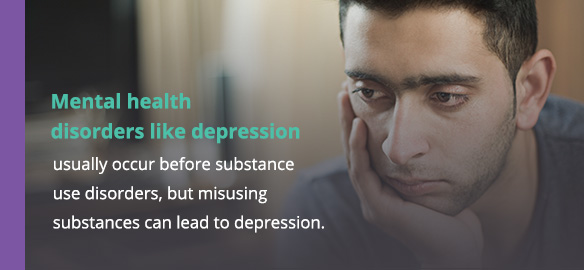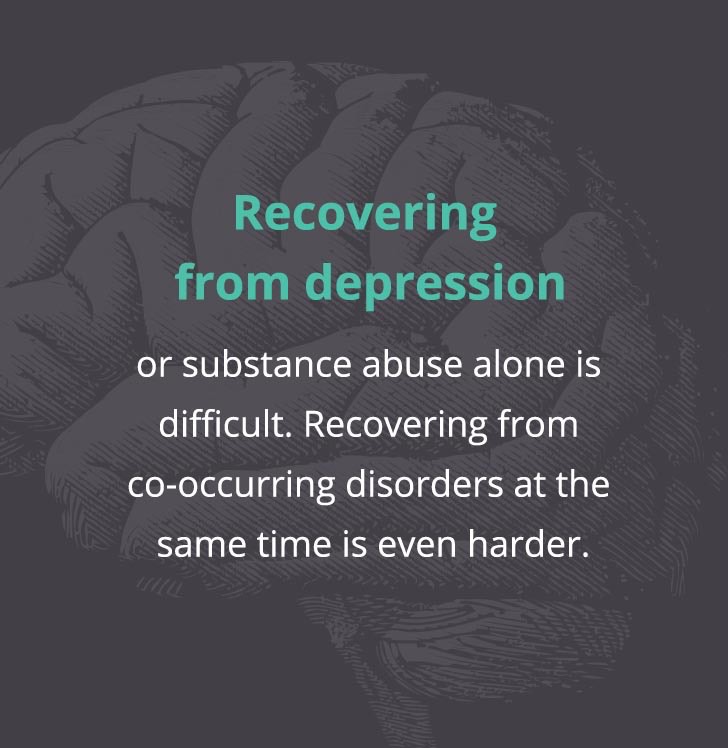Depression is more than feeling sad or stressed. It’s a continuing condition that can interrupt regular activity. If untreated, depression can become more severe and develop into a serious illness. It can affect performance at work or school and interfere with personal relationships. In the worst situations, depression can lead to suicide.
A large number of people who suffer from depression never seek medical treatment. Instead, some seek substances of abuse to help them feel better. They turn to alcohol or illicit drugs to feel more relaxed or escape sad feelings. While some feel a temporary benefit, people who turn to substances of abuse for help often feel worse in the long run. Misusing alcohol or drugs can lead to long-term organ damage or addiction.
People who misuse drugs and alcohol often begin to feel changes in personality, lose interest in things that used to be important to them and become over-sensitive, nervous or paranoid. They may also begin to suffer physical problems like loss of coordination, tremors or increased body temperature.
Mental health disorders like depression usually occur before substance use disorders, but being that alcohol is a depressant,misusing alcohol and other substances can lead to depression. The coexisting disorders make symptoms of depression worse, and drug or alcohol use can interfere with standard treatments for depression. People with depression often suffer from anxiety disorders, like post-traumatic stress disorder, too.

Treating multiple coexisting disorders can be difficult. People suffering from coexisting disorders need professional help to recover from the conditions. Fortunately, specialized rehabilitation clinics treat all conditions simultaneously, boosting the effectiveness of treatment.
Types of Depression
Depression isn’t the same for everyone. It can range in severity and duration. Different people feel different symptoms of depression and react to treatments and outside substances uniquely.
In general, health care professionals usually classify depression as mild, moderate or severe. There are also different types of depression, including:
Major depression
People who suffer major depression experience major difficulties in their ability to work, eat, sleep and feel pleasure. Some people experience major depression once in their life, and others endure multiple experiences.
Persistent depressive disorder
People who are affected by persistent depressive disorder feel depressed for two years or more. They suffer from multiple major depression experiences, and their feelings in between fluctuate.
Psychotic depression
People with psychotic depression suffer from depression and some form of psychosis. They may have delusions, hallucinations or have troubling thoughts.
Postpartum depression
An estimated 10 to 15 percent of women experience depression after giving birth. The condition stems from the overwhelming responsibility that accompanies caring for a newborn combined with drastic physical and hormonal changes.
Seasonal affective disorder
Some people experience depression from changes in their environment, like the decrease in natural light during the winter months. People with seasonal affective disorder tend to get better during spring and summer months.
Bipolar disorder
People with bipolar disorder encounter extreme mood changes, feeling manic at times and depressed at other times.
People experience similar symptoms no matter what type of depression they suffer from. The symptoms may change in severity or duration depending on the depression type.
Symptoms of Depression
The signs and symptoms of depression vary from person to person. Some people feel different symptoms at different points in their lives or during different episodes of depression.
- Long-lasting feelings of sadness or anxiety
- Loss of hope or optimism
- Feeling restless
- Reduced energy
- Memory problems
- Changes in appetite
- Suicidal thoughts or ideation
- Persistent feelings of guilt or worthlessness
- A loss of interest in pleasurable activities
It is natural to feel depressed at some point in your life. Often, depression is a reaction to everyday circumstances. However, a person feeling a combination of the symptoms or symptoms lasting more than two weeks may have depression.
Causes of Depression
There are a variety of reasons people suffer depression. Social, environmental, psychological and biological factors all contribute to the way people feel. Some life events are more likely to contribute to depression, like losing a job, losing a personal relationship or trauma.
Studies indicate about 20 percent of Americans suffering from anxiety disorders or depression have a substance use disorder.
Certain genes also contribute to the likelihood of suffering depression, which is why it seems to run in families. Sometimes doctors know why someone feels depressed, and other times the reasons aren’t as clear.
The condition is a physical illness. Doctors see physical changes in the brains of people with depression. It affects the areas of the brain that control behavior, mood, appetite and sleep. That’s why recovery from depression may require medical treatment.
Struggling with Depression and Addiction?
Our recovery programs are designed to meet your individual needs.
Get Help Now
Treating Substance Abuse Disorders and Depression
The most effective way to treat co-occurring disorders like substance abuse and depression is to do so at the same time. Treatment for both can help lead patients to a happier life.
Treatment for depression depends on the severity of the condition. Doctors may prescribe eating healthy, exercising and avoiding certain situations to treat mild depression. More severe depression can be treated with medication, therapy or both.
Medications for depression include:
Antidepressants
The drugs work by affecting chemicals in the brain called neurotransmitters like serotonin, norepinephrine and dopamine.
Tricyclics
Tricyclics are older drugs that are rarely used because of their extreme side effects.
MAOI’s
Monoamine oxidase inhibitors increase the levels of multiple neurotransmitters in the brain.
SSRI’s
Selective serotonin reuptake inhibitors increase the amount of serotonin in the brain.
SNRI’s
Serotonin and norepinephrine reuptake inhibitors increase serotonin levels and reduce norepinephrine in the brain.
Every medication used to treat depression causes side effects. Doctors should always make sure the benefits outweigh the risks of medical treatment. Drugs are often prescribed in combination with evidence-based behavioral therapy.
Various types of therapy exist, but the main types used to treat depression are cognitive behavioral therapy and interpersonal therapy. CBT is a treatment that helps people interpret their lives in a positive way and change behaviors or ways of thinking that may be contributing to depression. Interpersonal therapy helps people manage difficult relationships that may contribute to depression.
Behavioral therapy is typically used to help people recover from substance abuse disorders too. Depending on the substance of abuse and the individual, treatments can include a detoxification process and additional medication to help with withdrawal symptoms.
Getting Help

Recovering from depression or substance abuse alone is difficult. Recovering from co-occurring disorders at the same time is even harder.
Some rehabilitation facilities specialize in co-occurring disorders and can provide the support, health care and resources people suffering from both conditions need to get better.
People suffering from depression and substance abuse don’t have to be alone. Health care professionals with a passion for recovery are available to help them lead a happier life.
Medical Disclaimer: DrugRehab.com aims to improve the quality of life for people struggling with a substance use or mental health disorder with fact-based content about the nature of behavioral health conditions, treatment options and their related outcomes. We publish material that is researched, cited, edited and reviewed by licensed medical professionals. The information we provide is not intended to be a substitute for professional medical advice, diagnosis or treatment. It should not be used in place of the advice of your physician or other qualified healthcare provider.
 Addiction
Addiction
 Treatment
Treatment
 Faith & Religion
Faith & Religion
 Active Recovery
Active Recovery
 Our Community
Our Community





